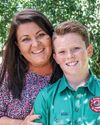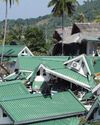
The Russian invasion of Ukraine has triggered Europe's largest population movement since the Second World War. More than four million people have left the country and a quarter of the population has been displaced. As a journalist, I have reported from many conflict zones, including Afghanistan, Iraq, Yemen, Syria, and Libya. But what I find striking about the war in Ukraine is the sheer scale of the number of women and children fleeing the Russian invasion.
For weeks, Ukrainian cities in the north, east, and south of the country have faced constant bombardment from Russian artillery. Many towns, villages, and communities have been flattened. Lives have been lost. Homes destroyed. Livelihoods overturned. Most of those trying to flee the brutalities of this war have been making their way west to the relative safety of Lviv – just 70 kilometers from the Polish border.
It is the city's main railway station which has best captured the human struggle of this conflict and the story of the Ukrainian people. It is a story of pain and sorrow. A place where hundreds of thousands of families have been torn apart as mostly women and children frantically try to board the overcrowded trains heading to Poland and beyond, while sons, brothers, husbands and fathers stand on the platform bidding farewell. Men of fighting age aren't allowed to leave the country. So, they say their goodbyes and head in opposite directions – uncertain of when, or if, they will ever be reunited with their families again.
Diese Geschichte stammt aus der May 2022-Ausgabe von The Australian Women's Weekly.
Starten Sie Ihre 7-tägige kostenlose Testversion von Magzter GOLD, um auf Tausende kuratierte Premium-Storys sowie über 8.000 Zeitschriften und Zeitungen zuzugreifen.
Bereits Abonnent ? Anmelden
Diese Geschichte stammt aus der May 2022-Ausgabe von The Australian Women's Weekly.
Starten Sie Ihre 7-tägige kostenlose Testversion von Magzter GOLD, um auf Tausende kuratierte Premium-Storys sowie über 8.000 Zeitschriften und Zeitungen zuzugreifen.
Bereits Abonnent? Anmelden

Maggie's kitchen
Maggie Beer's delicious veg patties - perfect for lunch, dinner or a snack - plus a simple nostalgic pudding with fresh passionfruit.

Reclaim your brain
Attention span short? Thoughts foggy? Memory full of gaps? Brigid Moss investigates the latest ways to sharpen your thinking.

The girls from Oz
Melbourne music teacher Judith Curphey challenged the patriarchy when she started Australia's first all-girls choir. Forty years later that bold vision has 6500 members, life-changing programs and a new branch of the sisterhood in Singapore.

One kid can change the world
In 2018, 10-year-old Jack Berne started A Fiver for a Farmer to raise funds for drought relief. He and mum Prue share what happened next.

AFTER THE WAVE
Twenty years ago, the Boxing Day tsunami tore across the Indian Ocean, shredding towns, villages and holiday resorts, and killing hundreds of thousands of people from Indonesia to Africa. Three Australians share their memories of terror, loss and survival with The Weekly.

PATRICIA KARVELAS How childhood tragedy shaped me
Patricia Karvelas hustled hard to chase her dreams, but it wasn't easy. In a deeply personal interview, the ABC host talks about family loss, finding love, battles fought and motherhood.

Ripe for the picking
Buy a kilo or two of fresh Australian apricots because they're at their peak sweetness now and take inspiration from our lush recipe ideas that showcase this divine stone fruit.

Your stars for 2025
The Weekly’s astrologer, Lilith Rocha, reveals what’s in store for your astrological sign in 2025. For your monthly horoscope, turn to page 192.

MEL SCHILLING Cancer made me look at myself differently'
One year on from going public with her bowel cancer diagnosis, Mel Schilling reveals where she's at with her health journey and how it's changed her irrevocably.

Nothing like this Dame Judi
A few weeks before her 90th birthday, the acting legend jumped on a phone call with The Weekly to talk about her extraordinary life – and what’s still to come.